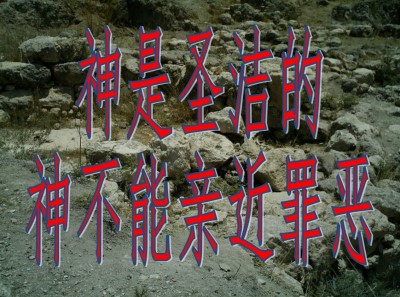 神為什麼擊殺烏撒?
神為什麼擊殺烏撒?撒母耳記下6:1-11
神的恩典吸引我們相信他、愛他、服從他。談到神的恩典,我們時常只想到神的愛,耶穌的十字架,我們罪孽得到饒恕等。很少有人告訴我們神處罰世人也是他表示他的恩典的方法之一。這種恩典(處罰)就是本文的主題。
在舊約聖經撒母耳記下第六章,大衛王把神的約櫃,從巴拉猶大移到另外一個地方時,“…拉車的牛差一點絆倒了。烏撒就伸手扶住上帝的約櫃。主上帝因烏撒的冒犯,向他發怒,擊殺他。他就死在上帝約櫃的旁邊…”(撒母耳記下6:6-7 《聖經:現代中文譯本》。
愛世人的神怎麼能夠處罰好意扶持約櫃的烏撒?這不殘忍嗎?神的恩典在哪裡呢?
請讓我提出以下的原則幫助我們理解神的作為,和他為什麼這樣審判烏撒。
1. 神的恩典和慈愛都跟他的聖潔有關。只有一位十全十美的神,一位聖潔的神,一位與罪孽無關的神,才能施恩給世人。
2。關於神的聖潔,有一點使得我們驚訝、吃驚、害怕。那就是神的聖潔是帶有能力的;神的聖潔蘊藏着力量。因此,神的聖潔很危險。神的聖潔使得我們敬畏他。因此,我們不要以為神只會施恩,而不會懲罰世人。我們說要敬畏這位聖潔的神的意思並不是說我們要躲避神,乃是叫我們敬畏神,順服神。
請讓我打個比方:電流對人類很有用處。但是,我們必須“敬畏”電流,不然它會害死我們。我們天天用電。大部分人從小都接觸電力,但是沒有人說,“因為我用電,用了四十年,所以我對電流非常隨便。我可以‘玩’它;我不怕”。我們對汽車、飛機、汽油都是一樣的。不可以說,因為我開車,開了二十年,所以我對汽車很隨便。我們越了解汽車的結構,使得我們越尊敬汽車和設計汽車的工程師。同樣,我們在神的面前不可以隨便。不可以“玩”神的恩典。不可以說,“我成為基督徒已經有三十年,所以我不必敬畏神。在他的面前我可以隨便一點。他的聖潔不會讓我害怕”。不是。相反的,我們越理解神的本質,包括神的聖潔,我們因而越來越敬畏這位偉大,願意施恩的神。
烏撒早知道神的約櫃代表神,而且神已經明確地規定,因為約櫃等於是“神所在地”,所以任何人都不能靠近約櫃,更不能觸摸它。我想,如果神是有形有體的神,烏撒就不敢伸出手來摸神的身體,所以,同樣的道理,他也不應該伸出手來扶持神的約櫃。
我曾經見過不同國家的總統。三次我在某國總統的面前。一次離他很近(不到一公尺的距離);兩次離他比較遠(幾公尺的距離)。但是,我太太跟總統握過手。總統周圍有警衛員(保鏢)。他們的責任只有一,沒有二——他們要保護總統。每次我在總統的範圍內,如果我伸出我的手來想要摸他,警衛員立刻會制止我。譬如總統跌倒,我伸出手來扶持他,警衛員會讓我知道那是他們的責任,而不是我的責任!今天在某些國家,如果有人試着親近總統,他馬上就會被槍斃!所以,烏撒違反神的聖潔,他侵犯神的座位。有罪而屬於肉身的人污染了那即聖潔又永恆的神。因此烏撒以命報償。
3。神對“不尊敬”一詞的觀念和定義與我們不一樣。我們應該接受神對“不尊敬”與“罪”的定義,而盡量不做任何讓神不高興的事情。烏撒不認為他的行動對神不尊敬,但是他的行動違反了神的誡命。
4。我們可以假設烏撒肯定是“好意”。今天,我們說“我們好意”不是好藉口使得我們輕視神的聖潔,而不受懲罰。因為我們愛神,所以我們要順服神,要讓神高興。既使我們覺得神的某些誡命“沒意思”、“太過分”、“不必要”時,我們對神的愛和信心還是應該使得我們敬畏他,順服他。烏撒的動機是“好意”,但是他的“好意”不能超越神的權威、聖潔和誡命。
今天基督徒把神看為天上的“天父”,把耶穌基督稱呼為“長兄”。 我們唱詩歌說,“耶穌是我最好的朋友”,讚美神說,“他居住在我們的心中”。沒錯!但是我們不要忘記神還是那位高高在上者,是創造天地萬物人類的上帝。神是聖潔的,所以我們要敬畏他,要順服他一切的誡命。

圖片:公元前二千多年迦南地的城門;之後這就是以色列伯示麥。Photo: Taken in Beth Shemesh, Israel, this city gate goes back to over 2000 B.C. and predates the Israelite occupation of Canaan. ©Photo by Edward Short.
《聖經:現代中文譯本》THE HOLY BIBLE: Today’s Chinese Version, published by the Hong Kong Bible Society. © United Bible Societies, 1979.)
Uzzah and God’s Holiness
2 Samuel 6:1-11
The grace of God draws us to believe in him, love him and obey him. When we speak of God’s grace, normally we think of his love, the cross of Jesus and how God forgives our sins. Rarely are we told that the punishment of sin is also an expression of God’s grace. Punishment as a form of grace is the subject of this article.
The sixth chapter of 2 Samuel records how King David moved the ark of God from Balle-judah to another place. “…Uzzah reached out his hand to the ark of God and took hold of it, for the oxen shook it. The anger of the LORD was kindled against Uzzah; and God struck him there because he reached out his hand to the ark; and he died there beside the ark of God” (2 Samuel 6:6-7, NRSV).
Why did this God who is said to love all people punish well-meaning Uzzah for reaching to steady the ark? Is this not cruel? What happened to God’s grace?
Allow me to submit the following principles to help us understand God, and his act of judgment toward Uzzah.
1. God’s grace and love are connected to his holiness. Only a perfect and holy God, one who has no contact whatsoever with sin, can extend grace to mankind.
2. There is one element of God’s holiness that surprises and scares us. God’s holiness is powerful! Because it’s so powerful, it’s also dangerous; because it’s dangerous, God’s holiness causes us to honor, respect and revere him. Consequently, we should not assume that God can only dispense grace, but that he’s unable to exact punishment. To respect this holy God does not mean that we avoid God, but rather that we respect and obey him.
Let me give some examples of what I mean. Electricity is very useful to mankind, but we must “respect” electricity, otherwise it will kill us. We use electricity every day, and most of us have done so since we were small. But no one says, “Since I’ve used electricity for forty years, I can treat it very casually. I can play with it without fear.” The same is true for automobiles, airplanes and fuel. I mustn’t say that because I’ve driven a car for twenty years, I don’t have to be careful. The more we understand what makes an automobile go, the more we appreciate cars and the engineers who design them. Likewise, we shouldn’t be so relaxed in the presence of God; we can’t take God for granted, or “play” with his grace. One must not say, “I’ve been a Christian for thirty years, so I need not stand in awe of God; I can be a bit laid-back in his presence. His holiness doesn’t scare me.” No, no. Rather, the more we understand the nature of God, including his holiness, the more we’ll stand in awe of this great God who wants to extend his grace to us.
Uzzah knew that the ark represented God, and that God had explicitly stipulated that because the ark was where God “resided,” therefore no one could go near the ark, much less touch it. I think that if God had a body, Uzzah would not have dared to extend his hand and touch God himself. Similarly, he should not have extended his hand and touched the ark.
I have been in the presence of a head-of-state three times—once within two or three feet of a president and twice within several yards. My wife once shook hands with a president. Each time there were body guards close by, and it was their duty to protect their president. Had I reached my hand toward the president, I would have been restrained immediately. Even if he had stumbled and I had reached to catch him, the body guards would have indicated in no uncertain terms that he and his problem was their responsibility, not mine. In some countries today, if anyone were to approach the head-of-state without permission, he would be shot. Should it surprise us then, that when Uzzah presumed to violate the holiness of God—to contaminate the divine and immortal with the profane and physical, that it cost him his life?
3. God looks at “disrespect” and interprets it differently from the way we do. We should accept God’s definition of disrespect and sin, and should do our best not to do anything to cause God to be unhappy with us. Uzzah didn’t think his own action was disrespectful, but, in fact, what he did broke one of God’s regulations.
4. We can assume that Uzzah acted with good intention. Today, simply saying, “My intentions are good,” is not an excuse for us to disregard God’s holiness, and thus be able to avoid punishment. Since we love God, we want to obey and please him. Even though we think that some of God’s commands are meaningless, excessive or unnecessary, our love for God and our faith in him should cause us to respect and obey him. Uzzah’s action stemmed from a good motivation, but his “good intention” couldn’t supersede God’s authority, his holiness or his commandment.
Today, Christians call God “heavenly Father,” and refer to Jesus Christ as “older brother.” In hymns we sing, “Jesus is my best friend,” and we praise God as he who “lives deep in my heart.” And all that’s correct! But we mustn’t forget that God is also the high and lofty one who created the universe and all that exists, including us. God is holy, so we must respect him, and obey all of his commandments.
烏撒與神的聖潔
撒母耳記下6:1-11
作者:謝德華 ©By Edward Short
Uzzah and God’s Holiness
2 Samuel 6:1-11
